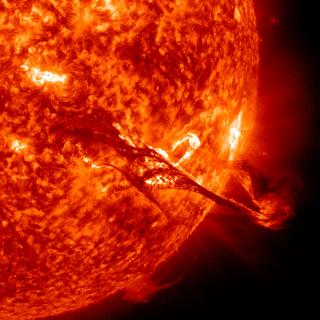Bibcode
Khomenko, E.; Kochukhov, O.
Referencia bibliográfica
The Astrophysical Journal, Volume 704, Issue 2, pp. 1218-1238 (2009).
Fecha de publicación:
10
2009
Revista
Número de citas
13
Número de citas referidas
9
Descripción
Rapidly oscillating Ap (roAp) stars exhibit an astrophysically
interesting combination of strong, dipolar-like magnetic fields and
high-overtone p-mode pulsations similar to the Sun. Recent time-resolved
spectroscopy of these stars unravelled a complex picture of propagating
magnetoacoustic pulsation waves, with amplitude and phase strongly
changing as a function of atmospheric height. To interpret these
observations and gain a new insight into the atmospheric dynamics of
roAp stars we have carried out two-dimensional time-dependent,
non-linear magnetohydrodynamical simulations of waves for a realistic
atmospheric stratification of a cool Ap star. We explore a grid of
simulations in a wide parameter space, treating oscillations of the
velocity, magnetic field, and thermodynamic quantities in a
self-consistent manner. Our simulations foster a new understanding of
the influence of the atmosphere and the magnetic field on the
propagation and reflection properties of magnetoacoustic waves,
formation of node surfaces, and relative variation of different
quantities. Our simulations reproduce all main features of the observed
pulsational behavior of roAp stars. We show, for the first time, that
the overall depth dependence of the pulsations in roAp atmospheres is
strongly influenced by the density inversion at the photospheric base.
Proyectos relacionados

Magnestismo Solar y Estelar
Los campos magnéticos son uno de los ingredientes fundamentales en la formación de estrellas y su evolución. En el nacimiento de una estrella, los campos magnéticos llegan a frenar su rotación durante el colapso de la nube molecular, y en el fin de la vida de una estrella, el magnetismo puede ser clave en la forma en la que se pierden las capas
Carlos Cristo
Quintero Noda